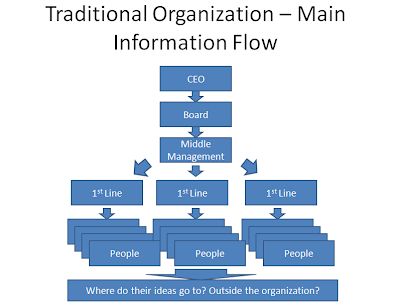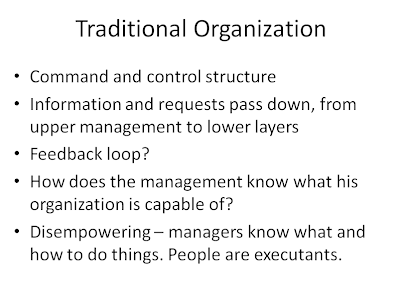On an additional note, the longer the command chain from the upper management to the people, the more managers will try to find a way to justify their power positions and the more the people from the lower levels will be demotivated and will take less risks. The organization becomes stiff, focused on processes and conformance.
In an empowering organization, the command chain is short, people from the lower levels of the hierarchy come with suggestions, ideas, improvements that are passed upwards to higher management which acts upon them. After all, engineers know best what is capable from the technology they have at hand, have ideas on what should or can be improved, designers and marketers know more about the latest trends on the market and thus know how to innovate in their areas, and so on. Competitive edge lies in the hands of people who are passionate, eager to perform and have the power to act upon their knowledge. From this comes motivation, trust, commitment, involvement, attachment, and self fulfilment.
How does an organization become empowering?
First of all, it all starts with a company culture that has trust in their own strength and is willing to trust its workforce. From such a culture emerges a trend to focus more on strategy and future and let go the control on people. Management then focuses on improving the processes and removing the impediments from the face of their men and women, so that everyone can concentrate on what they know and love to do. Instead of giving directions, managers will ask their people how they can help them achieve higher performance. People will feel that they have the power to control the outcome of their work and will want to prove that they are up to the trust they are given. The more they have control on their own work, the more they will get aware of what their impediments and limitations are and they will want to improve on that. A creativity and learning loop is then created that propagates throughout the organization - better products, happier workforce, more innovation, better processes, better strategies, more awareness and more involvement.
Instead of having one brain working for the entire team to define what each one does, you have the benefit of having 10-15 brains working all together and cooperating. This comes from trust and it is all ignited by a culture in which people have faith in each other, have the power to define choices and choose for themselves, a culture in which manager's role is to propagate awareness and communication throughout the organization. Unfortunately, it takes a lot of courage for an organization to change as the process of changing a culture is painful and will trigger a defence reaction in most of its employees who may feel that their security and privileges may be compromised.




No comments:
Post a Comment